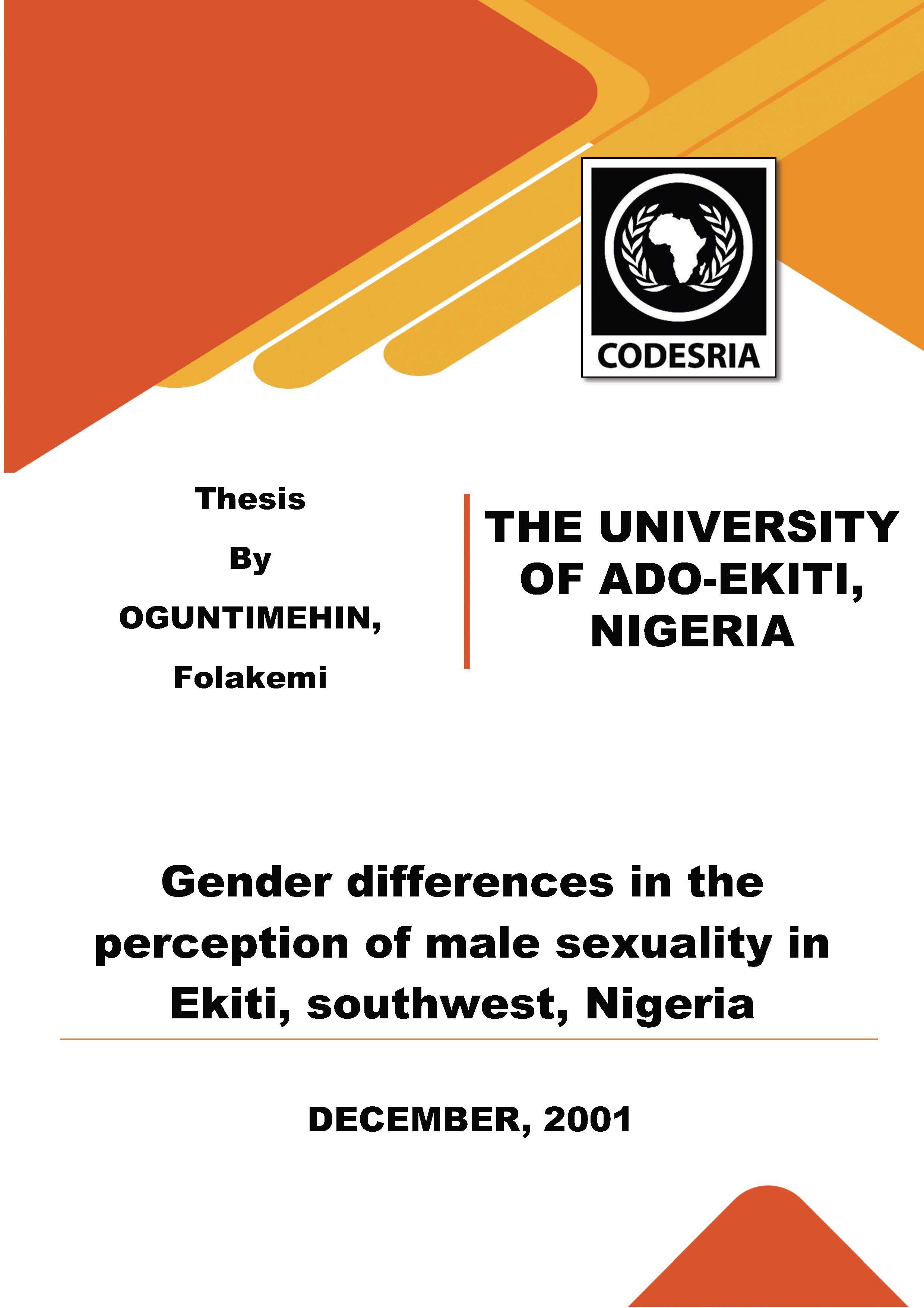Gender differences in the perception of male sexuality in Ekiti, southwest, Nigeria
Keywords:
Gender, perception, male sexuality, NigeriaSynopsis
Studies on male sexuality revealed that sexual norms operate differently for men and women. While women are usually expected to be chaste and remain within the confines of matriage, men enjoy some degree of permissiveness and sexual freedom.
The main objective of this study was to examine Gender Differences and Similarities in the Perception of Male Sexuality in Ekiti, Southwest, Nigeria. Towards achieving this aim, both quantitative and qualitative methods of data collection were employed. This was largely informed by the belief that issues of sexual behaviour are too subtle and complicated to be explored adequately using only standard (quantitative) survey technique. To further enrich this study, spouses were matched in the course of data collection.
The findings showed that a high rate of both male premarital and extramatital sex still obtained among the study population. However, much of the husbands' extramarital sexual relations was borne out of the need to satisfy pressing and overpowering sexual urge and the desire for the company of women other than their wives rather than the traditional need for a substitute when the wives are abstaining from sex following the birth of a child. Nonetheless, the husbands did not engage in sex with commercial sex workers but with girl friends and women friends.
The study also reported that some of the extramarital sexual relations occurred with some apprehension for catching STls. Sorne level of condom use/safe sex exists among the study population. However, there is still the belief that when one is selective and careful in his choice of sexual partners, he is not likely to contact STI.
Unlike in the past, when there was a universal assumption that wives have no right to comment upon, or even take note of husbands' sexual activities, this study had shown that wives have a right to know and to interfere in husbands' extramarital sexual activities. Indeed, many of the wives involved in this study were actually aware of their husbands' extramarital sexual relationships. The ability of a woman/wife to interfere, know and be aware of her husband's extramarital sexual activity is largely a function of spousal religion and educational status.
Besides, wives are increasingly attempting some control on their husbands' sexual behaviour. The findings of this study had shown that mothers are more likely to control their sons' sexuality than they would control their husbands. Parental disposition to their daughters' engagement in commercial sex was universally negative. However, those who chose to become sex workers were difficult to control.
A significant observation from this study was that marital fidelity is not impossible for men. While a significant proportion of the husbands indicated that a man would be happy if he has just a sexual partner in his lifetime, many of the wives expressed the buming desire to satisfy their husbands sexually. The path to this was given as adequate love and understanding. This study also showed that there are more gender similarities than differences regarding the perception of male sexuality among the study population. The only issue upon which the perception of the spouses tends to differ is whether there are biological
differences in men's and women's need for sex. The majority of the wives compared to their husbands upheld the opinion that men and women differ biologically in the number of sexual partners that they need. On the whole, the study has shown that gender perception of male sexuality is a function of socio-economic characteristics.
Downloads
References
Eades J.S. (1980) The Yoruba Today. Cambridge: Cambridge University Press.
Ekundare R.O. (1969) Marriage and Divorce under Yoruba Customary Law. Ibadan: University oflfe (now Obafemi Awolowo University) Press.
Ellis A.B. (1970) The Yoruba-Speaking Peoples of the Slave Coast of West Africa: Their Religion. Manners. Customs. Laws and Language etc. The Netherlands: Anthropological Publications.
Epstein A.L. (1981) Urbanisation and Kinship: The Domestic Domain on the Copperbelt of Zambia, 1950-56. London: Academic Press.
Erwin J.O. (1993) "Reproductive tract infections among women in ado-Ekiti, Nigeria: Symptoms recognition, perceived causes and treatment choices" in Caldwell J.C. et al. (eds) Sexual Networking and HIV/AIDS in West Africa. Supplement to Health Transition 3. Canberra: The Australian National University. Pp. 135-149.
Evans-Pritchard E.E. (1951) Kinship and marriage among the Nuer. Oxford: Clarendon Press.






